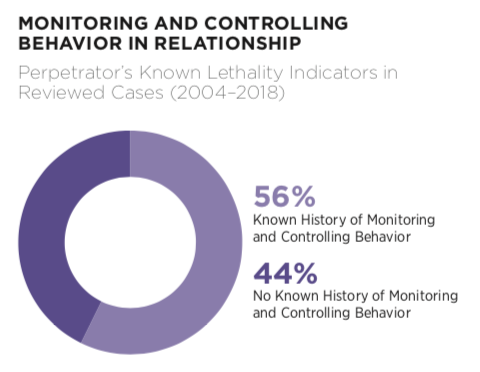Possessiveness over victim or severe/morbid jealousy
In a national study on risk of intimate partner homicide, victims of completed or attempted femicide experienced abuse by a partner who controlled all of their activities in 60 percent of cases (Campbell, 2017). The same study revealed that of abusers in those cases, 79 percent were violently jealous, making statements such as “If I can’t have you, no one can.” Georgia’s Project data supports the national findings that severe possessiveness of the victim and intense jealousy are precursors to potentially lethal abuse. In cases reviewed by the Project, perpetrators who went on to kill the victim were known to express attitudes of ownership over the victim 26 percent of the time.
Perpetrators of fatal abuse are also known to exhibit what researcher Neil Websdale refers to as “morbid jealousy.” Discussed in his book, Understanding Domestic Homicide, Websdale’s research reveals almost half of male perpetrators of intimate partner homicide displayed obsessive-possessive beliefs about their partners or former partners (Websdale, 1999).
Often growing from the perpetrator’s jealousy about the partner’s real or perceived affairs with other men, it is not uncommon for an abuser to socially or geographically isolate the victim. In roughly one-third of cases reviewed by the Project, the victim was isolated by the perpetrator prior to the homicide. In more than half of the cases reviewed by the Project, perpetrators were known to have exhibited monitoring and controlling behaviors towards the victim they later killed.
Monitoring and controlling behaviors are often a part of a pattern of stalking behaviors within the relationship, but also point to unhealthy levels of jealousy or possessiveness which can, in turn, indicate an increased level of fatal risk in an abusive relationship.



